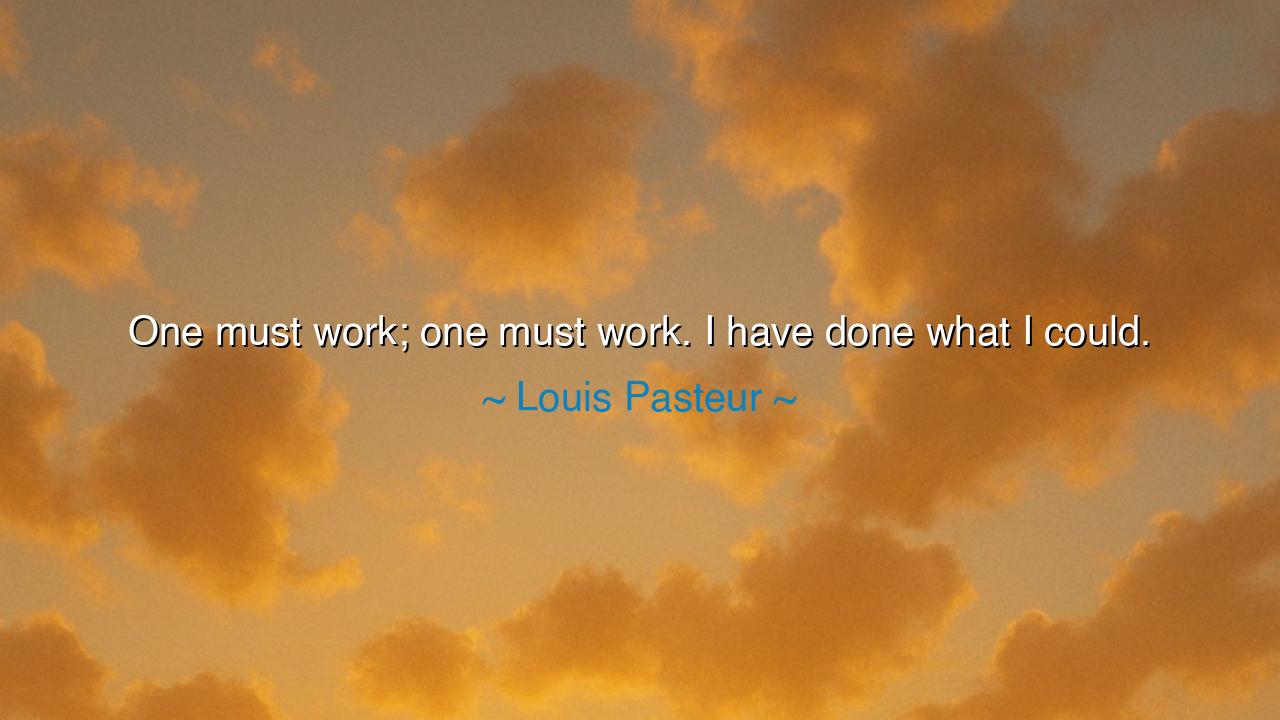
One must work; one must work. I have done what I could.






The words of Louis Pasteur, “One must work; one must work. I have done what I could,” rise like a solemn bell, echoing through the chambers of time. They are not merely the sigh of a weary man, but the declaration of a spirit that knew the sacred duty of labor. To work is not only to toil with the hands, but to offer the strength of the mind and the devotion of the heart to the service of life itself.
In these words, the great master of science affirms the eternal law: that human beings are born to strive. The earth yields her secrets only to those who bend their backs and sharpen their vision in pursuit of truth. The slothful soul, idle in the hours given, wastes the divine breath of existence. But the diligent one, though burdened, tastes the sweetness of purpose and leaves behind a harvest that nourishes generations.
The origin of this saying lies in the closing reflections of Pasteur’s life, a man who unveiled mysteries hidden in the unseen world of microbes. He did not boast of triumph, but rather spoke with humility: “I have done what I could.” Thus, the sage reminds us that no mortal can complete all things. The measure of greatness is not in endless accomplishment, but in faithful effort.
Let the youth and the elder alike remember: the call is not to perfection, but to work with sincerity until strength departs. To labor with devotion is to walk in harmony with the eternal rhythm of the universe. And when the final hour comes, it is enough to say with peace, “I have done what I could.” For such words are the crown of a life well-lived, and the offering of a soul that has honored its duty.






VTVinh Tan
This quote has me reflecting on what it means to give our all. Does working hard mean we've truly done our best? Or is there always room for improvement? I wonder if it’s possible to reach a point where we can honestly say we’ve given all we can, without feeling guilty for not doing more. What’s your take—do you think hard work always pays off, or is it more about knowing your limits?
TTtam tam
When I read this, it made me think about the idea of self-worth tied to work. If we’re always working, how do we measure the success of our efforts? Is it about results, or is it about knowing we’ve put our heart into something? Does the pressure to always work harder ever lead us to feel like we haven’t done enough, even when we truly have? How do others cope with that feeling?
NNNho Nguyen
I find myself wondering if this quote hints at the exhaustion that often comes with hard work. We hear so much about the value of relentless effort, but is there ever a time when we’ve truly done all we can? Could there be times when stepping back is just as important as pushing forward? What happens when our best is simply not enough, despite our dedication?
VTNguyen Van Thuan
This quote really highlights the importance of effort, but I’m curious: does working without rest ever feel like too much? When Pasteur says 'I have done what I could,' it makes me wonder how we should evaluate our own work. Is there a moment when we should stop, accept our limits, and move forward, or should we always push harder? How do we decide when enough is truly enough?
HADinh Hai Anh
It’s interesting to think about how this quote speaks to the importance of perseverance. Does working constantly and doing everything we can always lead to success, though? How do we deal with moments when our best doesn’t seem to be enough? At what point can we let go, knowing we've done all we could, without feeling like we’ve failed? I’d love to hear how others handle this balance between effort and result.